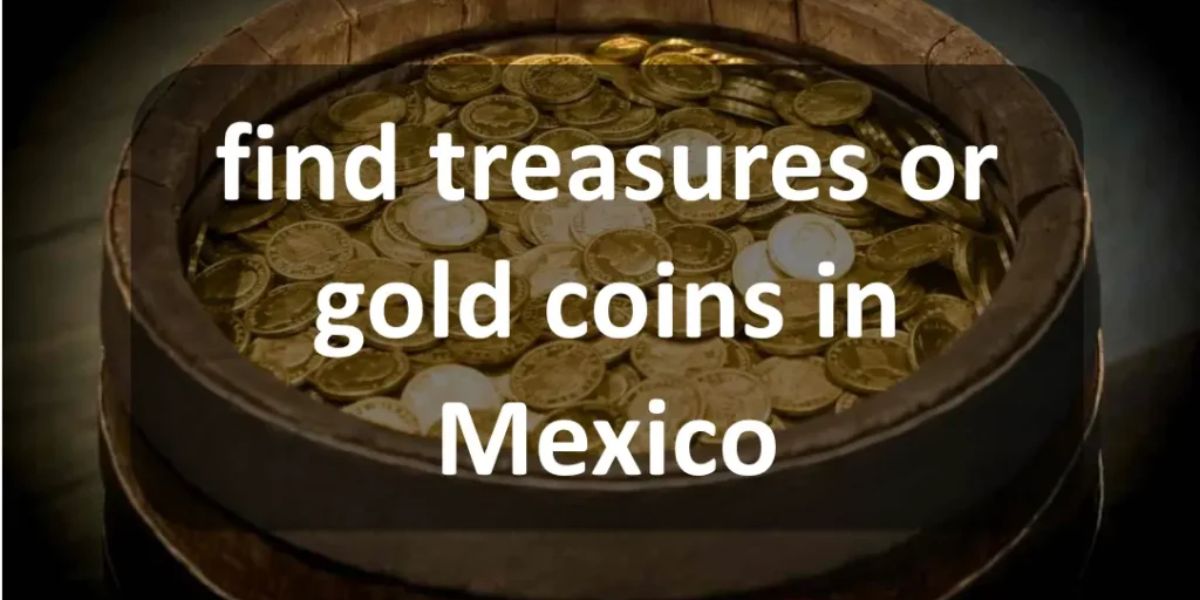MJP –
Finding a treasure is a dream shared by many, let’s not forget about the law though. In Mexico, the excitement of such a discovery comes with significant legal implications that extend far beyond the initial thrill.
Mexican lawmaking establishes clear rules on who has the right to keep discovered treasures and how these finds should be managed. It is critical to be aware of these laws to avoid legal issues and ensure that the discovery is handled fairly.
Mexican law regarding discovered treasures or gold coins
According to the Federal Civil Code, a treasure is defined as a hidden deposit of money, jewels, or other valuable objects whose legitimate origin is unknown.

This definition is crucial for anyone who stumbles upon a treasure, as it outlines the legal framework within which they must operate to avoid conflicts and ensure that their discovery is managed under the law.
- Understanding the definition of a treasure as per the Federal Civil Code.
- Knowing who has the legal right to claim a found treasure.
- Managing the discovery in a manner that complies with Mexican law.
SEE MORE –
New York’s Latest Law Enforces Motorist Alerts—How It Impacts Drivers
By familiarizing yourself with these legal stipulations, you can ensure that your treasure find is not only exciting but also legally sound, allowing you to navigate the complexities with confidence.
10 Must-Know Articles About Treasures in the Civil Code
The Civil Code’s Second Book, particularly in Title Four, delves into property and the regulations governing it. Within this title, Chapter III is exclusively dedicated to the regulation of treasures, which spans from Articles 875 to 885.
Defining a Treasure
According to Article 875, the law defines a treasure as any sum of money, jewelry, or other valuable items that have been hidden and whose original ownership is unknown. Essentially, this means the ownership is not identifiable. A treasure is considered an independent find, rather than a product of an estate.
Rights of the Discoverer
Article 876 clearly states that if a treasure is discovered on a property owned by the discoverer, they have the right to retain everything found.
The discovery of a treasure often sparks excitement and curiosity. But what happens when such a find occurs on someone else’s property or in a public space? Let’s delve into the legalities surrounding this intriguing scenario.
Division of Treasure: What the Law Says
According to Article 877, if a treasure is discovered on public land or on property that belongs to another person, the law mandates that the treasure be divided equally between the discoverer and the property owner.
Scientific or Artistic Value
When the discovered items hold significant value for science or art, Article 878 comes into play. This article clarifies that such items must be handed over to the nation. In return, the nation will compensate the involved parties with a fair price. This compensation is distributed according to Articles 876 and 877, ensuring both the property owner and the discoverer receive their due share.
Conditions for Discovering Treasure
It’s crucial to note that under Article 879, the discovery of treasure on someone else’s property must be entirely accidental for the discoverer to be entitled to a share.
Excavation Permissions
Moreover, Article 880 states that no one has the authority to carry out excavations or other works on another person’s land with the intent of searching for treasure without the owner’s consent.
- Article 877: Equal division between the discoverer and property owner.
- Article 878: Items of scientific or artistic value go to the nation with fair compensation.
- Article 879: Accidental discovery condition.
- Article 880: Permission required for excavation.
Understanding these laws ensures that if you ever stumble upon a treasure, you know exactly what steps to take and what your rights are.
If someone excavates without permission, Article 881 states that the landowner is entitled to keep the entire treasure.
Understanding Treasure Law Provisions
It is crucial to be aware of all the clauses set forth by the law in any case involving treasure. The laws are designed to protect the rights of landowners and ensure fair distribution in case of a discovery.
Excavation Without Permission
Article 882 specifies that if someone conducts excavations or any work on land that does not belong to them, with the intent of finding a treasure, and without the owner’s permission, that person is liable for any damages caused. Additionally, they must cover the costs to restore the land to its original condition.
If this individual is a tenant renting the land, the owner has the right to terminate the lease agreement and evict the tenant, even if the lease period has not yet concluded.
Mutual Agreement on Treasure Hunting
In scenarios where the landowner permits treasure hunting, Article 883 outlines that the involved parties can agree on how the expenses and discovered items will be distributed. If a prior agreement is not reached, the law mandates that the costs and findings be divided equally.
The nuances of property rights can often be complex, and Article 884 of the Civil Code provides clear guidelines on what happens when a treasure is discovered on a property. Understanding these rules can help property owners and usufructuaries navigate these situations effectively.
Who Keeps the Treasure? Understanding Article 884
Article 884 outlines the rules for treasure found on a property, depending on who discovers it. Here’s a breakdown of the scenarios:
1. Treasure Found by the Usufructuary
If the person with the right to use the property (known as the usufructuary) discovers a treasure, they are entitled to a portion of it. This follows the same regulations applicable when a stranger finds treasure on someone else’s property, as detailed in Articles 881, 882, and 883.
2. Treasure Found by a Third Party
When someone other than the owner or the usufructuary finds the treasure, the treasure is split between the property owner and the finder. In this case, the usufructuary does not receive any part of the treasure.
3. Treasure Found by the Property Owner
According to Article 885, if the property owner finds a treasure on land being used by a usufructuary, the usufructuary has no right to any portion of the treasure. The entire find belongs to the property owner.




